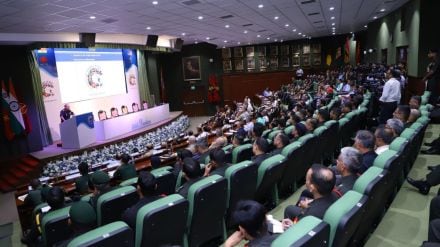Stage is set for India to host the Indo-Pacific Armies Chiefs Conference (IPACC) next week in Delhi. China and the ongoing tensions with Taiwan won’t be the main focus of the conference.
When asked if the tensions in the Taiwan Strait would be discussed, Major General Abhinaya Rai, Additional Director General (Strategic Planning), clarified that it wouldn’t be the central topic. Instead, the conference’s emphasis would be on collaboration.
This approach aligns with India’s stance in the Quad, a strategic security group that includes the US, India, Japan, and Australia. The Quad has repeatedly emphasized that it’s not an “anti-China” alliance, although China disagrees.
The Taiwan Strait, which separates Taiwan from mainland China, is a contentious issue. China regards Taiwan as a breakaway province, while Taipei claims to be a sovereign state. The US officially supports the one-China policy but opposes unilateral changes to the status quo from either side. It has pledged military support to Taipei in the face of Chinese aggression.
The US Department of Defence has recently reinforced deterrence measures in the Taiwan Strait to discourage aggressive actions by China.
The IPACC will run concurrently with the Indo-Pacific Armies Management Seminar (IPAMS) and Senior Enlisted Leadership Forum. The theme for the two-day event on September 25 and 26 is ‘Together for Peace: Sustaining Peace and Stability in the Indo-Pacific Region.’
This marks the 13th edition of IPACC, organized by the US Army since 1999, with India’s participation beginning in 2011. IPAMS, initiated in 1978, is in its 47th edition, with India joining in 2019.
Financial Express Online has reported earlier that approximately 30 nations will participate in both IPACC and IPAMS, aiming to build trust, understanding, and cooperation among land forces in the region and promote a free and open Indo-Pacific. The conference agenda primarily revolves around cooperation, interoperability, humanitarian assistance, crisis response, military diplomacy, and sustaining peace and stability.
Major General Rai highlighted that IPAMS has a broad mandate, potentially evolving at various levels, including chiefs, mid-level segments, and foundational soldiers. He stressed the opportunity for strengthening common perspectives and not fixating on a single issue like Taiwan.
Regarding India’s relations with the Association of Southeast Asian Nations (ASEAN), he emphasized the shared desire for a “free, open, and inclusive” Indo-Pacific. ASEAN, a coalition of Southeast Asian nations with territorial disputes with China in the South China Sea, seeks cooperation and openness rather than rivalry.
In discussions with ASEAN countries, it is crucial to establish a common understanding of territorial disputes in the Indo-Pacific and work collaboratively while ensuring interoperability, Major General Rai added.
The military’s role in Humanitarian Assistance and Disaster Relief (HADR) operations and addressing climate change will also be on the agenda.
